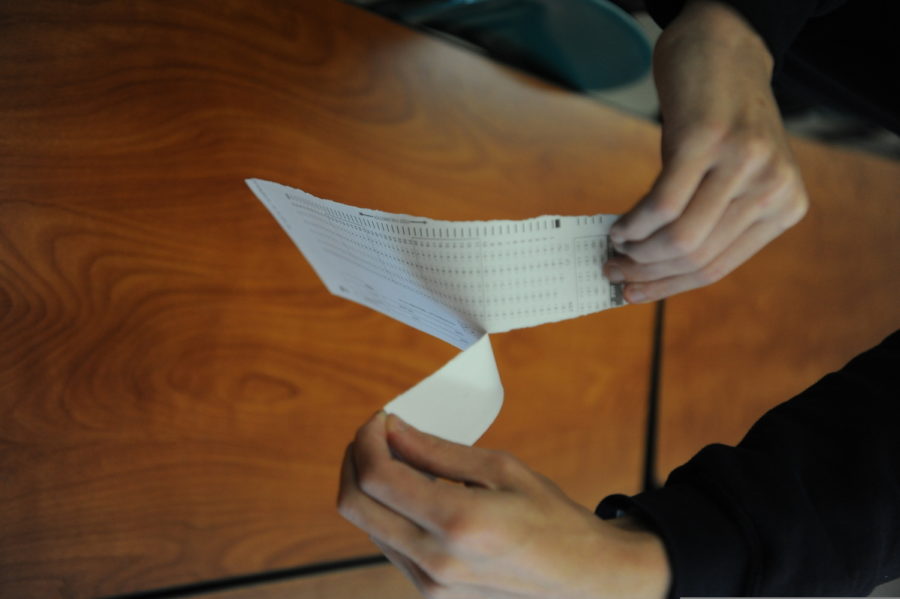A Paradigm Shift: the SAT Exam is Now Optional at Many Colleges and Universities
Many colleges are switching to test-optional and test-blind college admissions this year due to the ongoing COVID-19 pandemic.
Bronx Science students had mixed feelings about their SAT scores. “Initially, I was happy with my SAT score. but after consulting with some of my peers, I realized that when it comes to Bronx Science standards, my score was well below average. despite it being an excellent score relative to average scores of American high school students,” said Christopher Lall ’22.
On October 28th, 2021, many Bronx Science seniors who had signed up to take the SAT exam walked to the gym in a final bid to increase their SAT scores, before applying to early decision/early action colleges this fall. Even in the last few minutes before the exam began and everything was put away, seniors were still checking their notes and asking each other practice questions from Khan Academy. After countless months of studying, tutoring, and taking practice tests, this was the moment where they would make their mark.
This scene, once commonplace, could become less common in the next few years.
The SAT has been a rite of passage for juniors and seniors applying to college for many decades. First adapted from an army IQ test back in 1926, a revised version of the test was administered by the College Board in 1944 to over 300,000 college applicants in a single day. From then on, the exam only grew in popularity with universities and colleges, as they used the SAT exam as a prominent part of their college admissions data.
However, the onset of the COVID-19 pandemic has created a paradigm shift with colleges and the SAT exam.
During the pandemic, many students were unable or unwilling to take the SAT exam in person due to safety concerns. Universities responded with a ‘test-optional’ application model, where students can choose to send in SAT scores but by no means are they required to do so. Students have an overwhelmingly positive response to the policy. “I think that this is a good change. It benefits students who do well and want to submit their SAT test score, as it appears as an extra filter for them on the admissions process…[and] the score not being mandatory works very well for students who do poorly on standardized tests.” Christopher Lall ’22 said.
The implementation of a test-optional policy also helps colleges by providing them with a larger pool of qualified applicants. According to Michael Courtney, a former member of the undergraduate admissions committee at NYU, “people who never wanted to apply to these schools because they didn’t have the testing near the profile of a typical admit, but with strong grades and extracurriculars, aren’t as intimidated.”
A few colleges have even decided to take their test-optional policy one step further. Schools such as the University of California, CUNY, and CalTech have made the decision to drop SAT scores as a factor entirely. This “test-blind” policy has been more divisive than the test-optional policy.
Some students do not share that same enthusiasm about this new “test-blind” policy. “I think each college has a right to set their system for standardized testing; however, I personally think students should still have the option to submit their score if they did well, especially if their GPA and extracurriculars aren’t that strong,” said Chris Yang ‘22.
While students must exhibit their academic potential to college admissions officers in various ways, colleges have used the SAT to compare students from different high schools against each other. Without the test, college admissions officers could have a more difficult time understanding the skill level of individual applicants.
In response, some argue that the SAT is ineffective and may also be classist. The 2013 paper Race, Poverty, and SAT Scores showed a correlation between the income of a family and higher SAT scores. The increase could come from the fact that students from higher-income families have the financial means to learn with tutors and take the exam multiple times.
Currently, the future of college admissions is a mystery. Test-optional, test blind, and even required testing are all possible options in the next few years. One thing, though, is for sure: the SAT is under more pressure than ever before.
Currently, the future of college admissions is a mystery. Test-optional, test blind, and even required testing are all possible options in the next few years. One thing, though, is for sure: the SAT is under more pressure than ever before.
Tzvi Kalb is an Editorial Editor for 'The Science Survey.' For Tzvi, journalistic writing gives him incredible freedom to write on important issues and...

